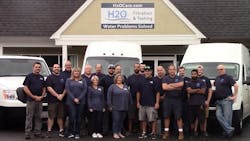About the author:
Michael Meyer is associate editor for WQP. Meyer can be reached at [email protected].
Editor's Note: Do you know a water treatment dealer who deserves recognition for leadership in the industry, innovative ideas or successful business practices? Nominate them to be featured as a WQP Dealer of the Month here. Self-nominations are accepted.
New England’s water presents the region’s residents and municipalities with a variety of challenges. Iron, manganese, trihalomethanes and even radon can be found in the water throughout the region, and it takes an experienced water quality dealer to properly diagnose and treat all these issues. The experts at H2O Care of Massachusetts have been creating solutions for New Englanders for 30 years, and the company’s consistently high standard of service has helped keep those in the region happy and healthy.
Creating an Identity
H2O Care traces its history back to 1989, when master licensed plumber Mark St. Hilaire formed Aqua Tech Water Systems in Middleton, Mass. In 1999, after a decade in business, Aqua Tech merged with Atlas Water Systems, a commercial water quality company, and St. Hilaire and his team became Atlas’ residential systems group. Fifteen years later, in 2014, Quench USA acquired Atlas, but Quench was not interested in maintaining the residential systems group.
With the help of Norm Marowitz—a board member and advisor for H2O Care, and a former part-owner of Atlas Water Systems—and some of his employees, St. Hilaire purchased the division from Quench. The newly independent company was named H2O Care Inc., and in the more than four years since its inception, it has grown to the point where it has opened a second location—in Hudson, Mass.—in order to more efficiently serve its customers in the Route 495 belt. Its service area now includes much of northern Massachusetts and areas of southeastern New Hampshire and southwestern Maine.
“We think that we get a good chunk of that market share because we do solid work, we guarantee everything and we have licensed plumbers so our plumbing work is solid,” Marowitz said. “We seem to be able to correct problems that other companies can’t.”
New England Nuisances
H2O Care faces an array of water quality issues every day, although its primary challenges often involve the excessive iron that is endemic to the region. In one case, St. Hilaire and his team were called upon to address an iron issue unlike any they had ever seen before at the Phan Zone Sports Center in Hampstead, N.H.
“They had iron that was off the charts,” Marowitz said. “Iron at 0.3 ppm, you start seeing some serious staining. This was not 0.3—this was over 220 ppm. Totally unheard of. They had no idea what to do. No one could fix the problem.”
After assessing the issue, St. Hilaire custom-designed a system that managed to not only bring the iron in the facility’s water down to an acceptable level, but also bring it into compliance with local water regulations.
“The state was surprised when they went in and did the testing and it was all clean,” St. Hilaire said.
“The state came in to test the water after we’d put the system in and they were shocked,” Marowitz said. “They just couldn’t believe it. They had been there previously, and they just had never seen iron so high, especially iron that high that could be treated. Mark designed a system that’s still working beautifully to this day. That’s the kind of thing we get—jobs like that.”
In addition to iron, manganese is becoming a frequent subject of H2O Care’s service. Some municipalities in the company’s service area have even sent water quality notices to residents due to excessive manganese levels.
“That’s opened up more city water treatment to us that we weren’t getting before,” St. Hilaire said. “We’re getting a lot more calls on town water.”
Staffing Concerns
H2O Care requires its employees to be properly trained and utterly committed to their work, and while they would not have it any other way, St. Hilaire and Marowitz feel that the company’s growth has been hindered somewhat by its high standards.
“In the last three years, our revenue has grown 67%, but even with that, we feel like we could have grown actually a little more if we’d had qualified people to add to our service staff and our install staff,” Marowitz said.
“And our sales staff, and our design staff,” St. Hilaire added.
“When you hire somebody new to train to be a service technician or an installer, it’s a long training period,” Marowitz said. “It’s at least six months before we feel they’re ready to actually go out and start doing even routine service and maintenance on systems. Before they get really good it’s probably a couple of years. That’s a limiting factor—you have to find good people who are committed and show up and care about customers in addition to being good technicians, and then it’s a long break-in period.”
In the end, however, this process is worth it, because it guarantees a level of service that encourages repeat business.
“We need to be invited back into people’s homes year after year to provide service for the systems we sell,” St. Hilaire said. “Everybody here is focused on doing a great job so those people are happy to invite us back, and they’re happy to refer us to their friends, to their neighbors, to their families, because if they don’t, you’re done. It’s just keeping everybody positive and keeping everybody focused on the customer first that’s made the difference for us.”
